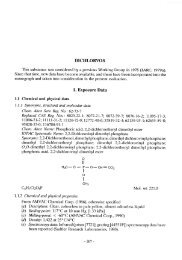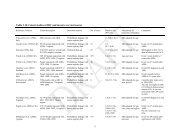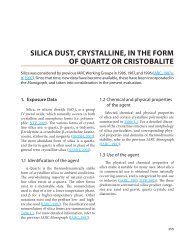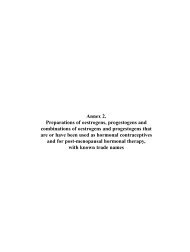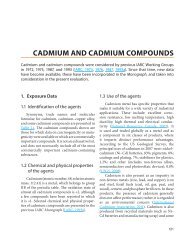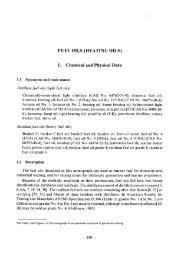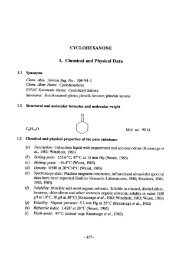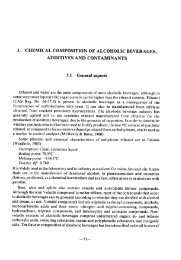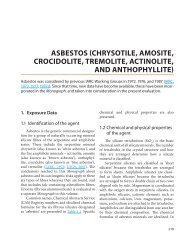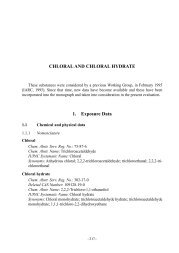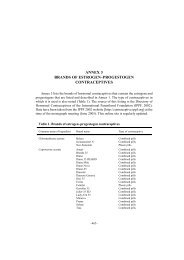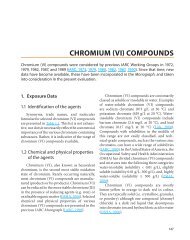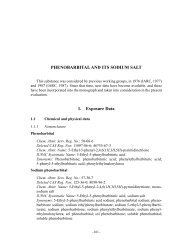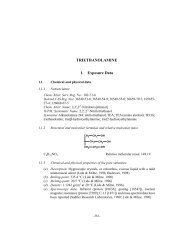- Page 1 and 2:
WORLD HEALTH ORGANIZATION INTERNATI
- Page 3 and 4:
IARC MONOGRAPHS In 1969, the Intern
- Page 5 and 6:
iv IARC MONOGRAPHS VOLUME 82 3.2 Th
- Page 7 and 8:
vi IARC MONOGRAPHS VOLUME 82 SOME M
- Page 10 and 11: IARC WORKING GROUP ON THE EVALUATIO
- Page 12 and 13: PARTICIPANTS 5 Observer, representi
- Page 14: PREAMBLE
- Page 17 and 18: 10 IARC MONOGRAPHS VOLUME 82 plasms
- Page 19 and 20: 12 IARC MONOGRAPHS VOLUME 82 collec
- Page 21 and 22: 14 agents present. For processes, i
- Page 23 and 24: 16 IARC MONOGRAPHS VOLUME 82 Finall
- Page 25 and 26: 18 IARC MONOGRAPHS VOLUME 82 and mi
- Page 27 and 28: 20 IARC MONOGRAPHS VOLUME 82 (c) St
- Page 29 and 30: 22 IARC MONOGRAPHS VOLUME 82 may le
- Page 31 and 32: 24 IARC MONOGRAPHS VOLUME 82 It is
- Page 33 and 34: 26 IARC MONOGRAPHS VOLUME 82 Data r
- Page 35 and 36: 28 when there is strong evidence th
- Page 37 and 38: 30 IARC MONOGRAPHS VOLUME 82 Vol. 7
- Page 40 and 41: GENERAL REMARKS ON THE SUBSTANCES C
- Page 42 and 43: GENERAL REMARKS ON THE SUBSTANCES C
- Page 44: GENERAL REMARKS ON THE SUBSTANCES C
- Page 48: SOME TRADITIONAL HERBAL MEDICINES
- Page 51 and 52: 44 which may include, for example,
- Page 53 and 54: 46 2. Use of Traditional Herbal Med
- Page 55 and 56: 48 IARC MONOGRAPHS VOLUME 82 decade
- Page 57 and 58: 50 IARC MONOGRAPHS VOLUME 82 Table
- Page 59: 52 3.2.1 Definition of herbal medic
- Page 63 and 64: 56 IARC MONOGRAPHS VOLUME 82 Table
- Page 65 and 66: 58 3.3.2 Germany (see Kraft, 1999;
- Page 67 and 68: 60 beyond placebo, and this informa
- Page 69 and 70: 62 3.3.5 Canada The Canadian Food a
- Page 71 and 72: 64 of adverse reactions to OTC drug
- Page 73 and 74: 66 IARC MONOGRAPHS VOLUME 82 3.3.12
- Page 75 and 76: 68 IARC MONOGRAPHS VOLUME 82 Jellin
- Page 77 and 78: 70 IARC MONOGRAPHS VOLUME 82 Simila
- Page 79 and 80: 72 IARC MONOGRAPHS VOLUME 82 Figure
- Page 81 and 82: 74 diameter of 4-6 cm or more, lobe
- Page 83 and 84: 76 1.2 Use 1.2.1 Aristolochia conto
- Page 85 and 86: 78 1.3.3 Aristolochia fangchi Compo
- Page 87 and 88: 80 1.6.2 Structural and molecular f
- Page 89 and 90: 82 chromatographic separation with
- Page 91 and 92: 84 may contain aristolochic acids.
- Page 93 and 94: 86 IARC MONOGRAPHS VOLUME 82 A bila
- Page 95 and 96: 88 received distilled water. The an
- Page 97 and 98: 90 IARC MONOGRAPHS VOLUME 82 Figure
- Page 99 and 100: 92 varied from undetectable (< 0.02
- Page 101 and 102: 94 lochic acids enhanced immune res
- Page 103 and 104: 96 4.4 Genetic and related effects
- Page 105 and 106: Table 3 (contd) Details of study DN
- Page 107 and 108: Table 4. DNA adduct formation with
- Page 109 and 110: Table 4 (contd) Details of study Co
- Page 111 and 112:
Table 5 (contd) Species Treatment I
- Page 113 and 114:
Table 6. DNA adduct formation by ar
- Page 115 and 116:
Table 6 (contd) Test system Assay D
- Page 117 and 118:
Table 6 (contd) Test system Assay D
- Page 119 and 120:
Table 7. Polymerase action on arist
- Page 121 and 122:
Table 8 (contd) Test system Drosoph
- Page 123 and 124:
116 of the forestomach and lung of
- Page 125 and 126:
118 lochic acid II (three metabolit
- Page 127 and 128:
120 IARC MONOGRAPHS VOLUME 82 Che,
- Page 129 and 130:
122 IARC MONOGRAPHS VOLUME 82 Healt
- Page 131 and 132:
124 IARC MONOGRAPHS VOLUME 82 Nishi
- Page 133 and 134:
126 IARC MONOGRAPHS VOLUME 82 Schme
- Page 135 and 136:
128 IARC MONOGRAPHS VOLUME 82 Yang,
- Page 137 and 138:
130 Figure 1. Morinda officinalis H
- Page 139 and 140:
132 1.3.2 Morinda officinalis A num
- Page 141 and 142:
134 by Soxhlet extraction with ethy
- Page 143 and 144:
136 2.1 Case-control studies 2.1.1
- Page 145 and 146:
138 3. Studies of Cancer in Experim
- Page 147 and 148:
140 1,3-Dihydroxy-2-hydroxymethylan
- Page 149 and 150:
142 4.3 Reproductive and developmen
- Page 151 and 152:
Table 1 (contd) Test system Result
- Page 153 and 154:
146 5.1 Exposure data 5. Summary of
- Page 155 and 156:
148 IARC MONOGRAPHS VOLUME 82 Brigg
- Page 157 and 158:
150 IARC MONOGRAPHS VOLUME 82 Nusko
- Page 160 and 161:
D. SENECIO SPECIES AND RIDDELLIINE
- Page 162 and 163:
metry (Witte et al., 1992). Thin-la
- Page 164 and 165:
sex were killed after a seven-week
- Page 166 and 167:
4.2.2 Experimental systems SOME TRA
- Page 168 and 169:
Table 1. Genetic and related effect
- Page 170 and 171:
Riddelliine induced unscheduled DNA
- Page 172 and 173:
5.3 Animal carcinogenicity data In
- Page 174 and 175:
SOME TRADITIONAL HERBAL MEDICINES 1
- Page 176:
SOME MYCOTOXINS
- Page 179 and 180:
172 Aflatoxin G 1 IARC MONOGRAPHS V
- Page 181 and 182:
174 IARC MONOGRAPHS VOLUME 82 Table
- Page 183 and 184:
Table 2 (contd) Method no. Aflatoxi
- Page 185 and 186:
178 indicates that A. flavus and A.
- Page 187 and 188:
Table 4. Occurrence of aflatoxin B1
- Page 189 and 190:
182 IARC MONOGRAPHS VOLUME 82 aflat
- Page 191 and 192:
Table 6. Co-occurrence of aflatoxin
- Page 193 and 194:
186 IARC MONOGRAPHS VOLUME 82 Figur
- Page 195 and 196:
188 1.4 International exposure esti
- Page 197 and 198:
190 (c) Impact of establishing maxi
- Page 199 and 200:
192 IARC MONOGRAPHS VOLUME 82 used
- Page 201 and 202:
194 IARC MONOGRAPHS VOLUME 82 aflat
- Page 203 and 204:
Table 10 (contd) Reference Area Uni
- Page 205 and 206:
198 were collapsed into a conventio
- Page 207 and 208:
Table 11 (contd) Reference Area Stu
- Page 209 and 210:
202 IARC MONOGRAPHS VOLUME 82 histo
- Page 211 and 212:
204 IARC MONOGRAPHS VOLUME 82 resid
- Page 213 and 214:
Table 12. Summary of principal case
- Page 215 and 216:
208 IARC MONOGRAPHS VOLUME 82 disea
- Page 217 and 218:
210 3. Studies of Cancer in Experim
- Page 219 and 220:
212 IARC MONOGRAPHS VOLUME 82 diet
- Page 221 and 222:
214 3.4 Administration with known c
- Page 223 and 224:
216 IARC MONOGRAPHS VOLUME 82 The 8
- Page 225 and 226:
218 observed in rat liver slices, a
- Page 227 and 228:
220 IARC MONOGRAPHS VOLUME 82 Figur
- Page 229 and 230:
222 IARC MONOGRAPHS VOLUME 82 an α
- Page 231 and 232:
224 (mainly hepatocellular carcinom
- Page 233 and 234:
226 IARC MONOGRAPHS VOLUME 82 but i
- Page 235 and 236:
228 lordosis and reduction in conce
- Page 237 and 238:
230 IARC MONOGRAPHS VOLUME 82 Table
- Page 239 and 240:
232 IARC MONOGRAPHS VOLUME 82 sampl
- Page 241 and 242:
234 In eight subjects (four from Ho
- Page 243 and 244:
Table 16 (contd) Test system Result
- Page 245 and 246:
238 IARC MONOGRAPHS VOLUME 82 aflat
- Page 247 and 248:
240 IARC MONOGRAPHS VOLUME 82 anima
- Page 249 and 250:
242 difference between the two stud
- Page 251 and 252:
244 IARC MONOGRAPHS VOLUME 82 HBV-t
- Page 253 and 254:
246 In a large cohort study in Shan
- Page 255 and 256:
248 experimental data in showing th
- Page 257 and 258:
250 IARC MONOGRAPHS VOLUME 82 Ander
- Page 259 and 260:
252 IARC MONOGRAPHS VOLUME 82 Buetl
- Page 261 and 262:
254 IARC MONOGRAPHS VOLUME 82 Denis
- Page 263 and 264:
256 IARC MONOGRAPHS VOLUME 82 Galla
- Page 265 and 266:
258 IARC MONOGRAPHS VOLUME 82 Heino
- Page 267 and 268:
260 IARC MONOGRAPHS VOLUME 82 Jalon
- Page 269 and 270:
262 IARC MONOGRAPHS VOLUME 82 Kirk,
- Page 271 and 272:
264 IARC MONOGRAPHS VOLUME 82 Lunn,
- Page 273 and 274:
266 IARC MONOGRAPHS VOLUME 82 Olubu
- Page 275 and 276:
268 IARC MONOGRAPHS VOLUME 82 Roll,
- Page 277 and 278:
270 IARC MONOGRAPHS VOLUME 82 Stett
- Page 279 and 280:
272 IARC MONOGRAPHS VOLUME 82 Verge
- Page 281 and 282:
274 IARC MONOGRAPHS VOLUME 82 Yang,
- Page 283 and 284:
Table 1. IARC evaluations Previous
- Page 285 and 286:
278 kernels and in less than 0.1% o
- Page 287 and 288:
280 2.5.3 Cottonseed A. flavus is a
- Page 289 and 290:
282 IARC MONOGRAPHS VOLUME 82 aflat
- Page 291 and 292:
284 IARC MONOGRAPHS VOLUME 82 aflat
- Page 293 and 294:
286 IARC MONOGRAPHS VOLUME 82 Table
- Page 295 and 296:
288 IARC MONOGRAPHS VOLUME 82 Figur
- Page 297 and 298:
290 IARC MONOGRAPHS VOLUME 82 Table
- Page 299 and 300:
292 IARC MONOGRAPHS VOLUME 82 aflat
- Page 301 and 302:
294 IARC MONOGRAPHS VOLUME 82 8. Re
- Page 303 and 304:
296 IARC MONOGRAPHS VOLUME 82 Guo,
- Page 305 and 306:
298 IARC MONOGRAPHS VOLUME 82 Marti
- Page 307 and 308:
300 IARC MONOGRAPHS VOLUME 82 Sharm
- Page 309 and 310:
302 (d ) Solubility: Soluble in wat
- Page 311 and 312:
304 1.4 Occurrence Fumonisins have
- Page 313 and 314:
306 Table 1 (contd) IARC MONOGRAPHS
- Page 315 and 316:
308 (c) Formation in commodities ot
- Page 317 and 318:
310 IARC MONOGRAPHS VOLUME 82 Table
- Page 319 and 320:
312 IARC MONOGRAPHS VOLUME 82 3.1 O
- Page 321 and 322:
314 3.2.2 Rat IARC MONOGRAPHS VOLUM
- Page 323 and 324:
316 with NDEA and fumonisin B 1, wh
- Page 325 and 326:
318 IARC MONOGRAPHS VOLUME 82 In pi
- Page 327 and 328:
Figure 2. Allometric relationship b
- Page 329 and 330:
322 IARC MONOGRAPHS VOLUME 82 obser
- Page 331 and 332:
324 IARC MONOGRAPHS VOLUME 82 Hepat
- Page 333 and 334:
326 4.2.3 Related studies IARC MONO
- Page 335 and 336:
328 4.3.2 Experimental systems IARC
- Page 337 and 338:
330 and litters on postnatal day 21
- Page 339 and 340:
Table 4. Genetic and related effect
- Page 341 and 342:
334 IARC MONOGRAPHS VOLUME 82 The f
- Page 343 and 344:
336 IARC MONOGRAPHS VOLUME 82 (d )
- Page 345 and 346:
338 IARC MONOGRAPHS VOLUME 82 treat
- Page 347 and 348:
340 4.5.2 Interference with fatty a
- Page 349 and 350:
342 IARC MONOGRAPHS VOLUME 82 Figur
- Page 351 and 352:
344 5.2 Human carcinogenicity data
- Page 353 and 354:
346 IARC MONOGRAPHS VOLUME 82 Alber
- Page 355 and 356:
348 IARC MONOGRAPHS VOLUME 82 Chamb
- Page 357 and 358:
350 IARC MONOGRAPHS VOLUME 82 Floss
- Page 359 and 360:
352 IARC MONOGRAPHS VOLUME 82 Hiroo
- Page 361 and 362:
354 IARC MONOGRAPHS VOLUME 82 Lee,
- Page 363 and 364:
356 IARC MONOGRAPHS VOLUME 82 Mobio
- Page 365 and 366:
358 IARC MONOGRAPHS VOLUME 82 Prelu
- Page 367 and 368:
360 IARC MONOGRAPHS VOLUME 82 Savar
- Page 369 and 370:
362 IARC MONOGRAPHS VOLUME 82 Steve
- Page 371 and 372:
364 IARC MONOGRAPHS VOLUME 82 Flett
- Page 373 and 374:
366 IARC MONOGRAPHS VOLUME 82 Yu, C
- Page 375 and 376:
368 disulfide, carbon tetrachloride
- Page 377 and 378:
Table 1 (contd) Sample matrix Sampl
- Page 379 and 380:
Table 3. Naphthalene production (th
- Page 381 and 382:
374 1.4 Occurrence 1.4.1 Natural oc
- Page 383 and 384:
Table 5. Occupational exposure to n
- Page 385 and 386:
378 water assuming a water concentr
- Page 387 and 388:
380 (Scheepers & Bos, 1992). The av
- Page 389 and 390:
382 (d ) Biodegradation Studies on
- Page 391 and 392:
384 IARC MONOGRAPHS VOLUME 82 Table
- Page 393 and 394:
386 3.2 Inhalation exposure 3.2.1 M
- Page 395 and 396:
388 3.3.2 Rat Ten BD I and BD III r
- Page 397 and 398:
Figure 1. Main metabolic pathways o
- Page 399 and 400:
392 IARC MONOGRAPHS VOLUME 82 and t
- Page 401 and 402:
394 IARC MONOGRAPHS VOLUME 82 and 1
- Page 403 and 404:
396 IARC MONOGRAPHS VOLUME 82 1-240
- Page 405 and 406:
398 IARC MONOGRAPHS VOLUME 82 Perfu
- Page 407 and 408:
400 Siegel and Wason (1986) reviewe
- Page 409 and 410:
402 IARC MONOGRAPHS VOLUME 82 liver
- Page 411 and 412:
404 IARC MONOGRAPHS VOLUME 82 to id
- Page 413 and 414:
406 IARC MONOGRAPHS VOLUME 82 Alkal
- Page 415 and 416:
408 hyperplasia, atrophy, chronic i
- Page 417 and 418:
410 had deficient glucose-6-phospha
- Page 419 and 420:
Table 10. Genetic and related effec
- Page 421 and 422:
Table 10 (contd) Test system Micron
- Page 423 and 424:
416 assay with or without metabolic
- Page 425 and 426:
418 There is some evidence of devel
- Page 427 and 428:
420 IARC MONOGRAPHS VOLUME 82 Bjør
- Page 429 and 430:
422 IARC MONOGRAPHS VOLUME 82 Conkl
- Page 431 and 432:
424 IARC MONOGRAPHS VOLUME 82 Envir
- Page 433 and 434:
426 IARC MONOGRAPHS VOLUME 82 Ho, C
- Page 435 and 436:
428 IARC MONOGRAPHS VOLUME 82 Lynch
- Page 437 and 438:
430 IARC MONOGRAPHS VOLUME 82 O’B
- Page 439 and 440:
432 IARC MONOGRAPHS VOLUME 82 Schee
- Page 441 and 442:
434 IARC MONOGRAPHS VOLUME 82 Versc
- Page 444 and 445:
STYRENE This substance was consider
- Page 446 and 447:
EPA Method 8260B can be used to det
- Page 448 and 449:
Styrene is produced mainly by catal
- Page 450 and 451:
STYRENE 443 Table 3. Use patterns f
- Page 452 and 453:
STYRENE 445 most samples taken from
- Page 454 and 455:
STYRENE 447 successive layers of ch
- Page 456 and 457:
Table 4 (contd) Country and year of
- Page 458 and 459:
Table 5. Biological monitoring of o
- Page 460 and 461:
STYRENE 453 Since 1990, the long-te
- Page 462 and 463:
same products resulted in exposures
- Page 464 and 465:
STYRENE 457 Ambient air monitoring
- Page 466 and 467:
200 μg/kg, although 77% of the foo
- Page 468 and 469:
Table 8 (contd) Country or region Y
- Page 470 and 471:
2.1 Case reports 2. Studies of Canc
- Page 472 and 473:
Table 10 (contd) Reference (country
- Page 474 and 475:
Table 10 (contd) Reference (country
- Page 476 and 477:
STYRENE 469 (95% CI, 1.4-5.2; 10 de
- Page 478 and 479:
who had been employed in 1964-70 (t
- Page 480 and 481:
elationship for styrene became nega
- Page 482 and 483:
atio, 4.4; 95% CI, 1.1-17 in multip
- Page 484 and 485:
controls versus 32/32 treated). No
- Page 486 and 487:
3.4 Intraperitoneal administration
- Page 488 and 489:
Figure 1. Main metabolic pathways f
- Page 490 and 491:
STYRENE 483 a maximum and averaged
- Page 492 and 493:
(b) Distribution STYRENE 485 An ear
- Page 494 and 495:
STYRENE 487 rats with phenobarbital
- Page 496 and 497:
STYRENE 489 gavage (100-350 mg/kg b
- Page 498 and 499:
CYP2E1 and CYP2F2) inhibited nasal
- Page 500 and 501:
model indicated that absorbed styre
- Page 502 and 503:
female workers in the glass fibre-r
- Page 504 and 505:
STYRENE 497 continuously for seven
- Page 506 and 507:
STYRENE 499 exposure concentrations
- Page 508 and 509:
STYRENE 501 The frequency of sponta
- Page 510 and 511:
STYRENE 503 groups. Only minor gene
- Page 512 and 513:
concentrations of styrene in air we
- Page 514 and 515:
Table 12. Cytogenetic studies in ly
- Page 516 and 517:
Table 13. Genetic and related effec
- Page 518 and 519:
(b) Experimental systems (see Table
- Page 520 and 521:
Table 14 (contd) Test system Result
- Page 522 and 523:
STYRENE 515 styrene 7,8-oxide. Joha
- Page 524 and 525:
Styrene 7,8-oxide can bind to DNA w
- Page 526 and 527:
STYRENE 519 a small and non-signifi
- Page 528 and 529:
STYRENE 521 and immune systems, liv
- Page 530 and 531:
STYRENE 523 Artuso, M., Angotzi, G.
- Page 532 and 533:
STYRENE 525 Brugnone, F., Perbellin
- Page 534 and 535:
STYRENE 527 Coccini, T., Maestri, L
- Page 536 and 537:
STYRENE 529 Edling, C., Anundi, H.,
- Page 538 and 539:
STYRENE 531 Gobba, F., Galassi, C.,
- Page 540 and 541:
STYRENE 533 Horvath, E., Pongracz,
- Page 542 and 543:
STYRENE 535 logical Study and the I
- Page 544 and 545:
STYRENE 537 Linhart, I., Gut, I.,
- Page 546 and 547:
STYRENE 539 Miller, S.L., Branoff,
- Page 548 and 549:
STYRENE 541 Newhook, R. & Caldwell,
- Page 550 and 551:
STYRENE 543 Pryor, G.T., Rebert, C.
- Page 552 and 553:
STYRENE 545 Sielken, R.L. & Valdez-
- Page 554 and 555:
STYRENE 547 Tsuda, S., Matsusaka, N
- Page 556 and 557:
STYRENE 549 Boffetta, P. (1996b) Ex
- Page 558:
Agent SUMMARY OF FINAL EVALUATIONS
- Page 561 and 562:
554 IARC MONOGRAPHS VOLUME 82 DGAL:
- Page 563 and 564:
556 IARC MONOGRAPHS VOLUME 82 PMTDI
- Page 565 and 566:
558 IARC MONOGRAPHS VOLUME 82 Aldri
- Page 567 and 568:
560 IARC MONOGRAPHS VOLUME 82 Benz[
- Page 569 and 570:
562 β-Butyrolactone 11, 225 (1976)
- Page 571 and 572:
564 IARC MONOGRAPHS VOLUME 82 Chlor
- Page 573 and 574:
566 Cyproterone acetate 72, 49 (199
- Page 575 and 576:
568 IARC MONOGRAPHS VOLUME 82 Diepo
- Page 577 and 578:
570 Ethionamide 13, 83 (1977); Supp
- Page 579 and 580:
572 IARC MONOGRAPHS VOLUME 82 Haema
- Page 581 and 582:
574 L Lasiocarpine 10, 281 (1976);
- Page 583 and 584:
576 IARC MONOGRAPHS VOLUME 82 Methy
- Page 585 and 586:
578 IARC MONOGRAPHS VOLUME 82 Nicke
- Page 587 and 588:
580 O Ochratoxin A 10, 191 (1976);
- Page 589 and 590:
582 IARC MONOGRAPHS VOLUME 82 Polyb
- Page 591 and 592:
584 Rhodamine 6G 16, 233 (1978); Su
- Page 593 and 594:
586 Sulfafurazole 24, 275 (1980); S
- Page 595 and 596:
588 1,1,1-Trichloroethane 20, 515 (
- Page 597 and 598:
590 Y Yellow AB 8, 279 (1975); Supp
- Page 599 and 600:
Volume 31 Some Food Additives, Feed
- Page 601:
All IARC publications are available



